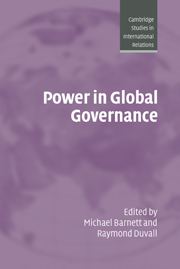Book contents
- Frontmatter
- Contents
- Notes on the contributors
- Acknowledgements
- 1 Power in global governance
- 2 Power, institutions, and the production of inequality
- 3 Policing and global governance
- 4 Power, fairness, and the global economy
- 5 Power politics and the institutionalization of international relations
- 6 Power, governance, and the WTO: a comparative institutional approach
- 7 The power of liberal international organizations
- 8 The power of interpretive communities
- 9 Class powers and the politics of global governance
- 10 Global civil society and global governmentality: or, the search for politics and the state amidst the capillaries of social power
- 11 Securing the civilian: sex and gender in the laws of war
- 12 Colonial and postcolonial global governance
- 13 Knowledge in power: the epistemic construction of global governance
- References
- Index
- CAMBRIDGE STUDIES IN INTERNATIONAL RELATIONS: 98
10 - Global civil society and global governmentality: or, the search for politics and the state amidst the capillaries of social power
Published online by Cambridge University Press: 22 September 2009
- Frontmatter
- Contents
- Notes on the contributors
- Acknowledgements
- 1 Power in global governance
- 2 Power, institutions, and the production of inequality
- 3 Policing and global governance
- 4 Power, fairness, and the global economy
- 5 Power politics and the institutionalization of international relations
- 6 Power, governance, and the WTO: a comparative institutional approach
- 7 The power of liberal international organizations
- 8 The power of interpretive communities
- 9 Class powers and the politics of global governance
- 10 Global civil society and global governmentality: or, the search for politics and the state amidst the capillaries of social power
- 11 Securing the civilian: sex and gender in the laws of war
- 12 Colonial and postcolonial global governance
- 13 Knowledge in power: the epistemic construction of global governance
- References
- Index
- CAMBRIDGE STUDIES IN INTERNATIONAL RELATIONS: 98
Summary
Global civil society exists. Although there remains considerable dispute about whom or what it includes, whether it is international or truly global, and how it is constituted, those agents, actors, organizations, institutions of transnational social and economic exchange and action are there, for all to see (Lipschutz with Mayer, 1996; Wapner, 1996; Keck and Sikkink, 1998; Colas, 2002). My objective in this chapter, therefore, is not to argue for the existence of global civil society (GCS) but, rather, to ask what it is. Is GCS a space or locus of sovereign agents or merely a structural effect? Does it wield compulsory power or it is a mere epiphenomenon, a reflection of the state system? Is GCS an institutional phenomenon, the result of the exercise of power by other actors, or is it a productive one, constituted by the social roles and relations growing out of contemporary states and markets? In surveying the growing literature on GCS, one can find supporters of all of these perspectives. This is not wholly surprising, since there is hardly a consensus to be found about the origins of domestic civil societies or their relationship to state and market (see, e.g., Jean Cohen and Arato, 1992).
In this chapter, I propose that global civil society is best understood in terms of institutional and productive power. GCS is generated through productive power, but its major actions rely primarily on institutional power. GCS is a product of global liberalism – perhaps globalist liberalism is a better term.
- Type
- Chapter
- Information
- Power in Global Governance , pp. 229 - 248Publisher: Cambridge University PressPrint publication year: 2004
- 8
- Cited by



